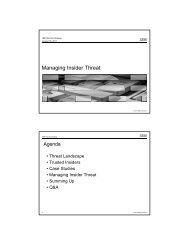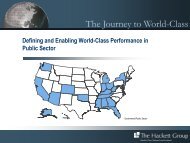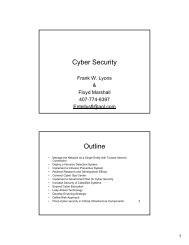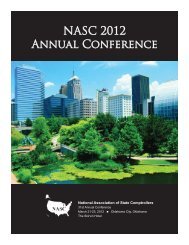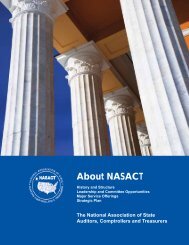Advisory Committee on Tax Exempt and Government Entities (ACT ...
Advisory Committee on Tax Exempt and Government Entities (ACT ...
Advisory Committee on Tax Exempt and Government Entities (ACT ...
Create successful ePaper yourself
Turn your PDF publications into a flip-book with our unique Google optimized e-Paper software.
The Appropriate Role Of The Internal Revenue Service With Respect To <strong>Tax</strong>-<strong>Exempt</strong> Organizati<strong>on</strong> Good Governance IssuesThe <strong>Tax</strong> Reform Act of 1969 required virtually all tax-exempt organizati<strong>on</strong>s to fileinformati<strong>on</strong> returns. 221 In additi<strong>on</strong>, the law broadened the scope of the Form 990 toinclude “the names <strong>and</strong> addresses of all substantial c<strong>on</strong>tributors, directors, <strong>and</strong> trustees,<strong>and</strong> other management officials—all of whom are ‘disqualified pers<strong>on</strong>s’ for the purposeof the new self-dealing rules <strong>and</strong> other provisi<strong>on</strong>s—<strong>and</strong> of highly compensatedemployees. Compensati<strong>on</strong> <strong>and</strong> other payments to managers <strong>and</strong> highly compensatedemployees also must be shown.” 222 The House report explained that “[t]his change isintended to facilitate meaningful enforcement of the limitati<strong>on</strong>s imposed by the bill,especially when combined with the publicity provisi<strong>on</strong>s <strong>and</strong> the sancti<strong>on</strong>s for failure tofile timely returns.” 223 The new publicity provisi<strong>on</strong>s required that the Forms 990 bemade available to State officials <strong>and</strong> that private foundati<strong>on</strong> filers allow public inspecti<strong>on</strong>of their informati<strong>on</strong> returns at the foundati<strong>on</strong> offices for at least 180 days. 224 In additi<strong>on</strong>,private foundati<strong>on</strong>s had to publicize these forms’ availability. However, the legislati<strong>on</strong>also provided that exempt organizati<strong>on</strong>s other than private foundati<strong>on</strong>s should notdisclose to the public the names <strong>and</strong> addresses of c<strong>on</strong>tributors. 225The next two decades saw several minor changes to the reporting requirements in thespirit of further increasing disclosure, a goal that c<strong>on</strong>tinued to res<strong>on</strong>ate acrossgovernment <strong>and</strong> parts of the private sector. For example, following the <strong>Tax</strong> Reform Actof 1969, John D. Rockefeller III, with the encouragement of several government figuresincluding then chairman of the House Ways <strong>and</strong> Means <str<strong>on</strong>g>Committee</str<strong>on</strong>g>, Wilbur D. Mills, <strong>and</strong>Secretary of the Treasury George P. Schultz, formed the “Filer Commissi<strong>on</strong>,” a privatelyfunded citizens’ panel designed to study the philanthropic giving <strong>and</strong> the U.S. voluntarysector <strong>and</strong> to make recommendati<strong>on</strong>s to strengthen both of these. The FilerCommissi<strong>on</strong> included a disclosure recommendati<strong>on</strong> “that all larger, tax-exemptcharitable organizati<strong>on</strong>s except churches <strong>and</strong> church affiliates be required to prepare<strong>and</strong> make readily available detailed annual reports <strong>on</strong> their finances, programs, <strong>and</strong>priorities.” The Commissi<strong>on</strong> believed that increased public accountability would improvethe general reputati<strong>on</strong> of the sector, which the Commissi<strong>on</strong> described as crucial:One of the c<strong>on</strong>venti<strong>on</strong>al wisdoms of the 1970’s is that virtually allinstituti<strong>on</strong>s, public <strong>and</strong> private, have declined in popular esteem <strong>and</strong>trust, especially those that exercise substantial ec<strong>on</strong>omic or politicalpower… A major source of this skepticism is said to be the widespreadfeeling that our instituti<strong>on</strong>s are bey<strong>on</strong>d society’s c<strong>on</strong>trol, that they areoperating for their own purposes which are often at odds with the publicinterest…it is likely that the [voluntary] sector’s instituti<strong>on</strong>s are includedto some degree in Americans’ doubts. Indeed, voluntary sectorinstituti<strong>on</strong>s would appear to be particularly susceptible to c<strong>on</strong>cerns221Id.222Id.223Id.224<strong>Tax</strong> Reform Act of 1969, Pub. L. No. 91-172, sec. 101(a)(1969).225Id.ADVISORY COMMITTEE ON TAX EXEMPT AND GOVERNMENT ENTITIES (<strong>ACT</strong>) June 11, 2008 93






